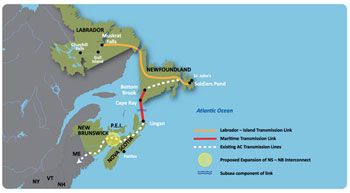HALIFAX - On January 11 the CD Howe Institute, a leading Canadian business think-tank, released a policy paper entitled, ‘Newfoundland’s Electricity Options: Making the Right Choice Requires an Efficient Pricing Regime”.
In this briefing note, CD Howe business analyst James P. Feehan (a business professor at Memorial University in St. John’s) argues that it is premature and imprudent for Newfoundland/Labrador to proceed with developing the Muskrat Falls hydro-electricity project.
Muskrat Falls is a 824 mega-watt (MW) hydro-electricity project, proposed for development by Newfoundland’s provincial crown utility Nalcor and Nova Scotia based private energy corporation Emera who own Nova Scotia's sole electric utility, Nova Scotia Power Inc.
in the paper, Dr. Feenhan argues that instead of developing Muskrat Falls, the provincial government of Newfoundland/Labrador should “reform provincial regulations that set artificially low prices for electricity and support excessive power consumption, which is a problem in Newfoundland as it is in other provinces.” On top of better prices to reflect to true costs of electricity, Dr. Feenhan’s analysis favors the development of on-island hydro developments, wind energy, and conservation.
Dr. Feenhan’s criticism joins that of the Federal Joint Review Panel (JRP) that was set up to examine the project. The JRP concluded, “Nalcor’s analysis that showed Muskrat Falls to be the best and least-cost way to meet the domestic demand requirements is inadequate...”
The planned $6.2 billion dollar deal is proposed to replace Newfoundland/Labrador’s existing fossil fuel electricity, helping to stabilize the price of electricity on the island of Newfoundland, and providing an opportunity for the Rock to connect to the North American electricity grid. The project also includes provisions for the export of ‘green power’ to Nova Scotia via a sub-sea cable that is to be owned by Emera. The project would cost Nalcor $4.4 billion to develop the dam at Muskrat Falls on the Lower Churchill River, while $1.8 billion would come from Emera’s subsidiary Nova Scotia Power Inc., who would pay $1.2 billion for the development of a sub-sea cable to the Rock in turn for the rights to 20% of the electricity output of the project (about160MW).
In Newfoundland the project would be a contribution to reducing the island's dependency on fossil-fuel burning for electricity at the Hollyrood power plant – an existing 490MW oil-burning facility that currently is only used to meet the peak demand for electricity in Newfoundland, typically in the colder seasons.
In Nova Scotia, it is claimed that Muskrat Falls will provide low-carbon, fixed price electricity on a 40-year contract, although no projected costs per kilowatt hour have yet been provided, and the provincial government of Nova Scotia and Emera have failed to transparently make the business case for the project, in comparison to other ‘low-carbon’ electricity import options, like hydro from Quebec. Quebec recently signed a 25 year fixed rate deal with the state of Vermont, at slightly higher than 7 cents a kilo-watt/hour. Coal electricity in Nova Scotia retails at around 12 cents a kilo-watt/hour.
The project is scheduled for completion by 2017, however has yet to receive regulatory approval, find proper financing or start construction, despite promises for loan guarantees from Ottawa. When complete, the project is expected to contribute up to 10% of Nova Scotia's 40% electricity target for the year 2020 and close at least one of Nova Scotia's existing coal-burning units at 400MW Lingan facility, in Cape Breton.



